Serving 880 students in grades 5-6, Youngblood Intermediate School ranks in the bottom 50% of all schools in Texas for overall test scores (math proficiency is bottom 50%, and reading proficiency is bottom 50%).
The percentage of students achieving proficiency in math is 30% (which is lower than the Texas state average of 41%). The percentage of students achieving proficiency in reading/language arts is 38% (which is lower than the Texas state average of 51%).
The student:teacher ratio of 15:1 is higher than the Texas state level of 14:1.
Minority enrollment is 96% of the student body (majority Hispanic), which is higher than the Texas state average of 75% (majority Hispanic).
Quick Stats (2025)
- Grades: 5-6
- Enrollment: 880 students
- Student:Teacher Ratio: 15:1
- Minority Enrollment: 96%
- Overall Testing Rank: Bottom 50% in TX
- Math Proficiency: 30% (Btm 50%)
- Reading Proficiency: 38% (Btm 50%)
- Science Proficiency: 27% (Btm 50%)
- Source: National Center for Education Statistics (NCES), TX Dept. of Education
School Overview
Youngblood Intermediate School's student population of 880 students has declined by 16% over five school years.
The teacher population of 59 teachers has declined by 22% over five school years.
Grades Offered
Grades 5-6
Total Students
880 students
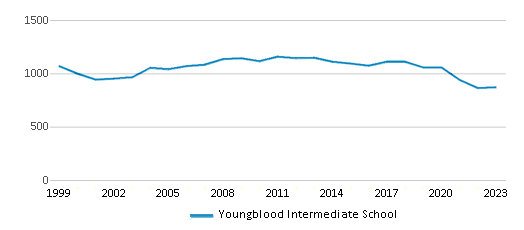
Gender %
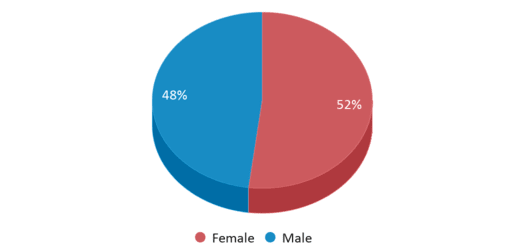
Total Classroom Teachers
59 teachers
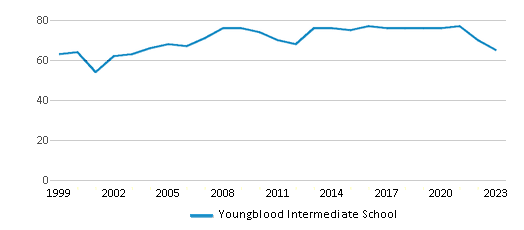
Students by Grade
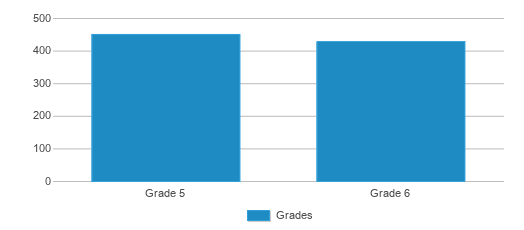
School Rankings
Youngblood Intermediate School ranks within the bottom 50% of all 8,188 schools in Texas (based off of combined math and reading proficiency testing data).
The diversity score of Youngblood Intermediate School is 0.59, which is less than the diversity score at state average of 0.64. The school's diversity has stayed relatively flat over five school years.
Overall Testing Rank
#6295 out of 8188 schools
(Bottom 50%)
(Bottom 50%)
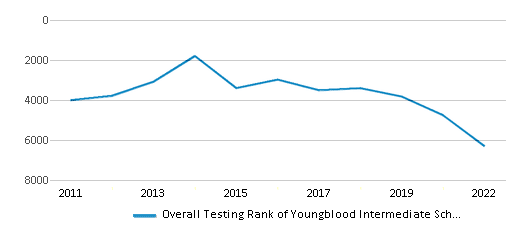
Math Test Scores (% Proficient)
30%
41%
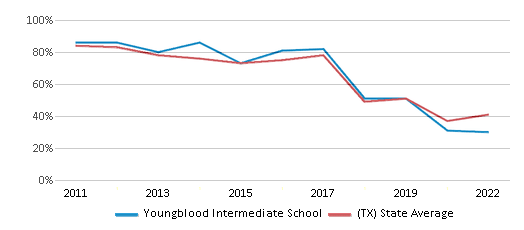
Reading/Language Arts Test Scores (% Proficient)
38%
51%
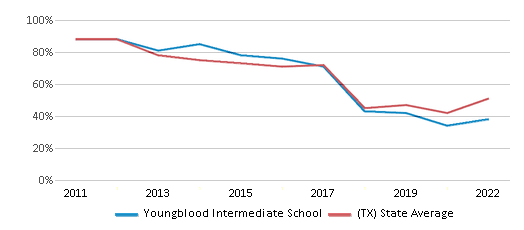
Science Test Scores (% Proficient)
27%
46%
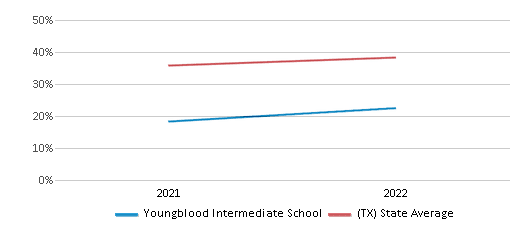
Student : Teacher Ratio
15:1
14:1
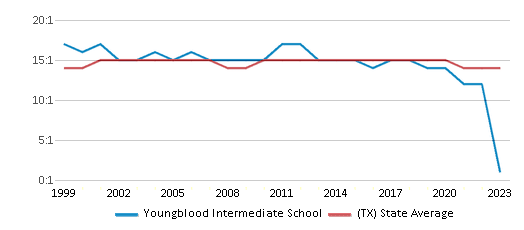
American Indian
n/a
n/a
Asian
18%
6%
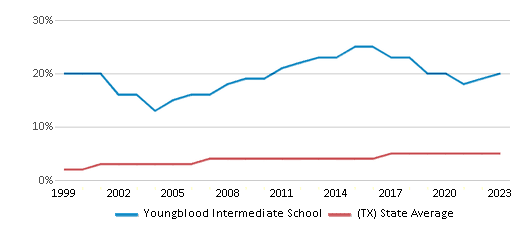
Hispanic
59%
53%
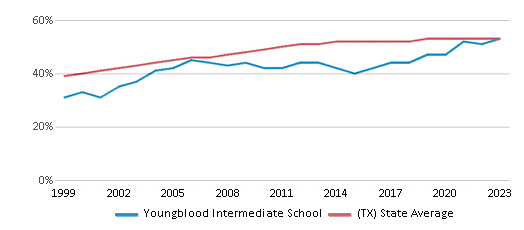
Black
19%
13%
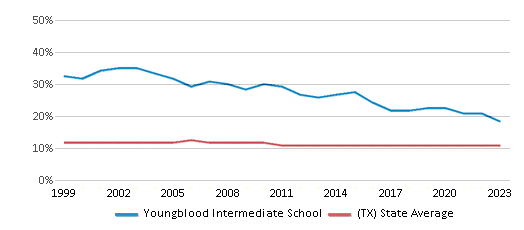
White
4%
25%
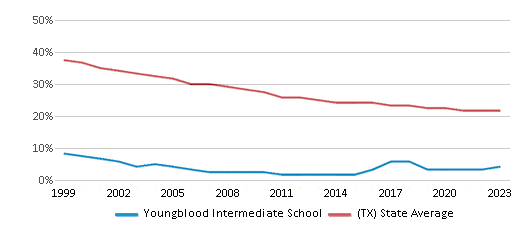
Hawaiian
n/a
n/a
Two or more races
n/a
3%
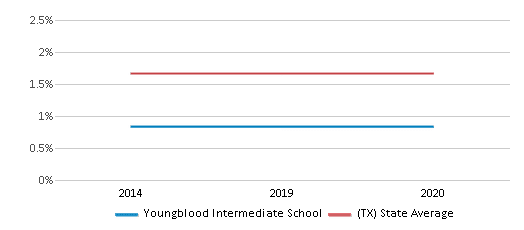
All Ethnic Groups
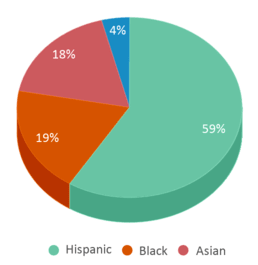
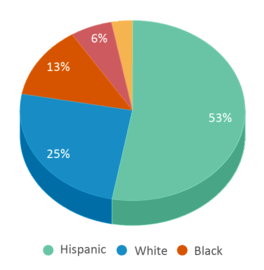
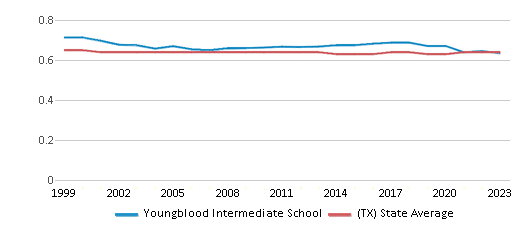
Participates in the National School Lunch Program (NSLP)
Yes
Eligible for Free Lunch
82%
57%
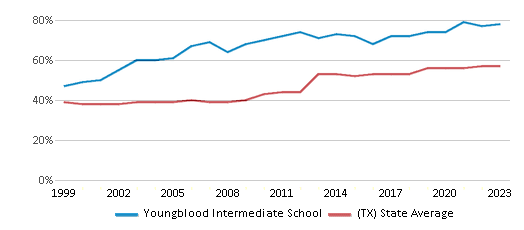
Eligible for Reduced Lunch
9%
5%
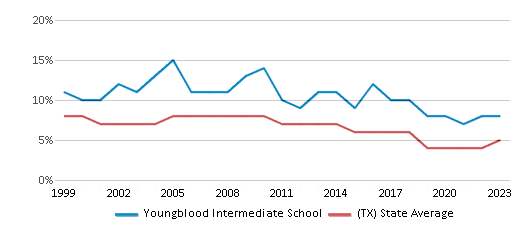
School Statewide Testing
School District Name
Source: National Center for Education Statistics (NCES), TX Dept. of Education
Profile last updated: 02/09/2025
Frequently Asked Questions
What is Youngblood Intermediate School's ranking?
Youngblood Intermediate School is ranked #6295 out of 8,188 schools, which ranks it among the bottom 50% of public schools in Texas.
What schools are Youngblood Intermediate School often compared to?
Youngblood Intermediate Schoolis often viewed alongside schools like Miller Intermediate School, Harmony School Of Discovery - Houston by visitors of our site.
What percent of students have achieved state testing proficiency in math and reading?
30% of students have achieved math proficiency (compared to the 41% TX state average), while 38% of students have achieved reading proficiency (compared to the 51% TX state average).
How many students attend Youngblood Intermediate School?
880 students attend Youngblood Intermediate School.
What is the racial composition of the student body?
59% of Youngblood Intermediate School students are Hispanic, 19% of students are Black, 18% of students are Asian, and 4% of students are White.
What is the student:teacher ratio of Youngblood Intermediate School?
Youngblood Intermediate School has a student ration of 15:1, which is higher than the Texas state average of 14:1.
What grades does Youngblood Intermediate School offer ?
Youngblood Intermediate School offers enrollment in grades 5-6
What school district is Youngblood Intermediate School part of?
Youngblood Intermediate School is part of Alief Independent School District.
In what neighborhood is Youngblood Intermediate School located?
Youngblood Intermediate School is located in the Alief neighborhood of Houston, TX. There are 32 other public schools located in Alief.
School Reviews
5 5/17/2016
I recommend this school to all of those young girls and boys because i was a student in 5 grade and i did 6 grade two i had mrs. jaramillo for math she is the best teacher if you behave good then everything goes good with all of the techers (: by the way this school is the best on how to make kids smart even tho alot of people are they jut don't use their brain.. after school programs is the best with YMCA teachers they are the coolest teacher just do the right thing (:
5 2/23/2011
i have been to this shcool and i love it ms stiley was my 5 grade teacher i miss some of my friend please tell them i said hy to melissa moreno marcelo escobar lionel lopez acelerino aguilal plase thank you
Review Youngblood Intermediate School. Reviews should be a few sentences in length. Please include any comments on:
- Quality of academic programs, teachers, and facilities
- Availability of music, art, sports and other extracurricular activities
Recent Articles

What Is A Charter School?
Explore the world of charter schools in this comprehensive guide. Learn about their history, how they operate, and the pros and cons of this educational innovation. Discover key facts about charter schools, including admission policies, demographics, and funding, as well as what to look for when considering a charter school for your child.

10 Reasons Why High School Sports Benefit Students
Discover the 10 compelling reasons why high school sports are beneficial for students. This comprehensive article explores how athletics enhance academic performance, foster personal growth, and develop crucial life skills. From improved fitness and time management to leadership development and community representation, learn why participating in high school sports can be a game-changer for students' overall success and well-being.

February 05, 2025
Understanding the U.S. Department of Education: Structure, Impact, and EvolutionWe explore how the Department of Education shapes American education, from its cabinet-level leadership to its impact on millions of students, written for general audiences seeking clarity on this vital institution.









